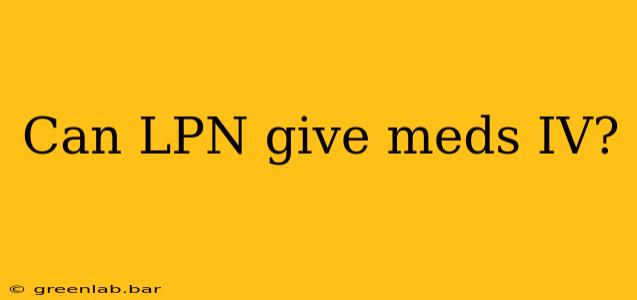Can LPNs Give IV Meds? A Comprehensive Guide for Nurses and Patients
The question of whether Licensed Practical Nurses (LPNs) can administer intravenous (IV) medications is a complex one, with the answer varying significantly depending on location, state regulations, and the specific employer's policies. There's no single, universally applicable answer. This guide will clarify the nuances and provide a comprehensive understanding of the issue.
State-Specific Regulations: The Primary Determinant
The most crucial factor determining an LPN's scope of practice regarding IV medication administration is the state's Nurse Practice Act. Each state's Board of Nursing defines the legal parameters of what LPNs are permitted to do. Some states explicitly allow LPNs to administer IV medications, while others strictly prohibit it. Many states fall somewhere in between, permitting IV administration under specific circumstances, such as:
- Supervision by an RN: In many jurisdictions, LPNs can administer IV medications only under the direct supervision of a Registered Nurse (RN). This supervision may involve ongoing monitoring, checking medication orders, and ensuring proper technique.
- Specific Training and Certification: Some states may require LPNs to complete additional training or obtain specific certifications before they're legally permitted to administer IV medications. This specialized training ensures competency in sterile technique, medication calculation, and recognizing potential complications.
- Type of IV Medication: Certain states might restrict IV medication administration to specific types of medications or fluids, excluding more complex or high-risk drugs. This could vary depending on the perceived risk of administration and potential adverse effects.
- Healthcare Setting: The type of healthcare facility also influences the scope of practice. An LPN working in a hospital setting might have different permitted responsibilities compared to one working in a clinic or long-term care facility.
Understanding the Roles of LPNs and RNs
It's essential to understand the fundamental differences in training and scope of practice between LPNs and RNs. RNs undergo more extensive education and training, covering a broader range of medical procedures and responsibilities. This difference in education often contributes to the variance in regulations surrounding IV medication administration.
LPNs typically have a shorter educational path, focusing more on basic nursing skills and patient care. While highly competent in many areas, the expanded responsibilities associated with IV therapy often fall outside their standard training.
The Importance of Patient Safety
Regardless of state regulations, patient safety remains paramount. If an LPN is permitted to administer IV medications, they must adhere strictly to established protocols and procedures to minimize risks. This includes meticulous attention to detail regarding:
- Sterile Technique: Maintaining a sterile environment during preparation and administration is crucial to prevent infection.
- Medication Calculation: Accurate calculation of medication dosages is essential to avoid medication errors.
- Patient Monitoring: Close monitoring of the patient's vital signs and reaction to the medication is necessary.
- Adverse Event Recognition: LPNs must be capable of recognizing and responding to adverse reactions or complications arising from IV therapy.
Conclusion: Always Verify Local Regulations
Ultimately, the question of whether an LPN can administer IV medications is not a simple yes or no. The answer is deeply dependent on state-specific Nurse Practice Acts and the individual healthcare facility's policies. Patients and nurses should always consult with their state's Board of Nursing or the relevant regulatory authority for definitive information about the scope of practice for LPNs within their jurisdiction. Always prioritize patient safety and adhere to established protocols.

